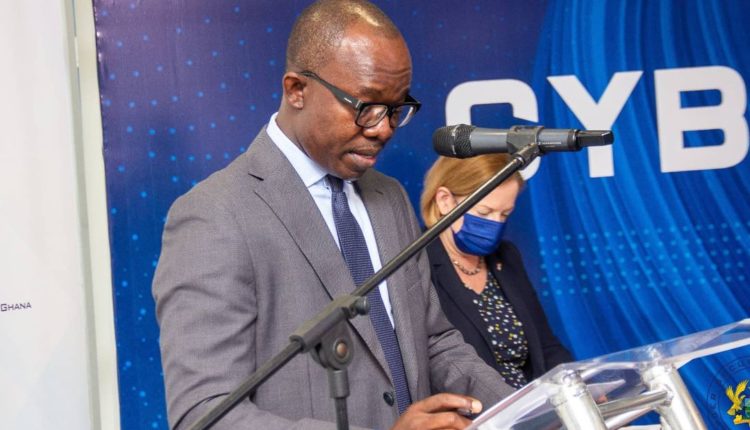Mrs. Ursula Owusu-Ekuful, Minister for Communications and Digitalization, has said the passage of Ghana’s Cybersecurity Act which has been considered as a world class legislature is the greatest achievement for the country with the focus on protecting its Critical Information Infrastructure.
According to her, the Act has become necessary because of the rapid digitalization of the Ghanaian economy, coupled with the high rate of cyber-crimes and other cybersecurity incidents adding that, it will promote the development of cybersecurity and regulate cybersecurity activities.
She further indicated that, President Akufo-Addo’s commitment to and recognition of cybersecurity as an imperative to securing the country’s digital economy remains the greatest achievement chalked and indeed a testament to a strong political commitment to institutionalize and develop Ghana’s cybersecurity.
The Ablekuma West legislature made this known last Friday, October 1, 2021 at the official launch of the National Cyber Security Awareness Month (NCSAM) 2021, and the Critical Information Infrastructure (CII) Directive under the theme “Ghana’s Cybersecurity Act 2020: Its Implications and the Role of Stakeholders.”
“A substantive Cybersecurity Act for Ghana is indeed a significant achievement at this stage of our cybersecurity development, and this, together with the revision of Ghana’s National Cybersecurity Policy and Strategy, ratification of both the Convention on Cybercrime (Budapest Convention) and the African Union Convention on Cyber Security and Personal Data (Malabo Convention), the launch of the Safer Digital Ghana programme by the Vice President, H.E. Dr. Alhaji Mahamudu Bawumia, the launch of the Cybercrime & Cybersecurity Incidents Reporting Points of Contact as well as capacity building for the public sector including training for the criminal justice sector are major interventions introduced by my Ministry through the National Cyber Security Centre during the first term of the government.
“I salute all the staff of the NCSC for your hard work which has brought us this far on this important journey – a journey to secure our digital economy. With the transition of the Centre into the Authority, history will remember the NCSC as an institution which established the various anchors and structures for Ghana’s cybersecurity development. Congratulations to all those who made this possible” she said.
Support
Mrs. Ursula in addition re-iterated government’s commitment to activities geared towards strengthening Ghana’s cyber security framework.
“I would like to conclude by commending the National Cyber Security Centre and all agencies and organisations, both national and international stakeholders and our partners, who have worked to bring us to this point of achievement. I will continue to urge all of us, as stakeholders to play our parts to ensure we have a secure cyber ecosystem. The Government as a cybersecurity enabler will continue to make the necessary efforts including relevant budgetary allocations to support our national cybersecurity development activities.”
She mentioned Ghana being part of the few African countries formalizing the protection of CIIs – a step she said would protect the country’s investments in digitalization developments and ensure it reaped the full digital dividends associated with digital transformation.
Forward-thinking
Dr. Albert Antwi-Boasiako, the Acting Director-General of the Cyber Security Authority (CSA) on his part said the passage of the Act has placed Ghana into a forward-thinking country on the Africa continent.
He revealed that, Ghana is now Africa’s first country to respond to cybersecurity challenges through regulations thus the latest ranking on the ITU’s Global Cybersecurity Index.
“Ladies and gentlemen, with the passage of the Cybersecurity Act, our country has further demonstrated a forward-thinking leadership on cybersecurity matters, as Ghana is now Africa’s first to respond to cybersecurity challenges through regulations. 3 Thus, our latest ranking on the ITU’s Global Cybersecurity Index is not only about what we have put in place as a country, but the appropriateness and the efficacy of what we have instituted. Ladies and gentlemen, the institutionalisation of Cybersecurity is a recent development. The United Kingdom established its National Cyber Security Centre in 2016 with a cybersecurity strategy backed by close to 2 billion pounds.
“The State of Israel’s National Cyber Security Authority begun its operations in 2016. Singapore, a country which serves as a model to many countries established its Cyber Security Agency in 2015. Indeed, Ghana passed its law which establishes the Cyber Security Authority, which will be outdoored by the Hon Minister, after Italy, which passed its legislation in 2019. Thus, the story of Ghana’s cybersecurity development, is not just about the story of the traditional development paradigm that frames developmental initiatives based on what others especially neighbours are doing, but most importantly it is a story that looks into the future and evidently, our modest achievements are currently inspiring the rest on the continent.”
Background of CII
Critical Information Infrastructure (CII) constitutes assets (real/virtual), networks, systems, processes, information, and functions that are vital to the nation such that their incapacity or destruction would have a devastating impact on national security, the economy, public health and safety.
CII may comprise a number of different infrastructures with essential interdependencies and critical information flows between them. The Cybersecurity Act, 2020 (Act 1038) defines a critical information infrastructure as a computer system that is essential for national security or the economic and social well-bring of citizens.




Comments are closed.